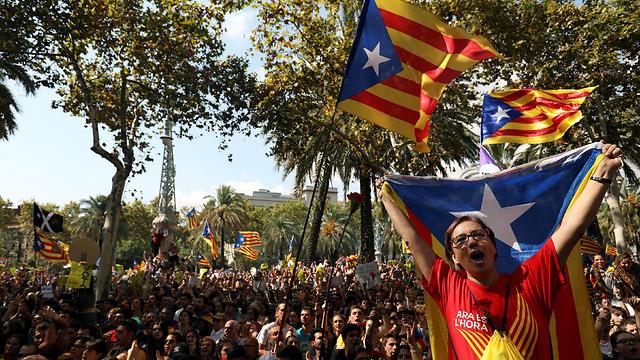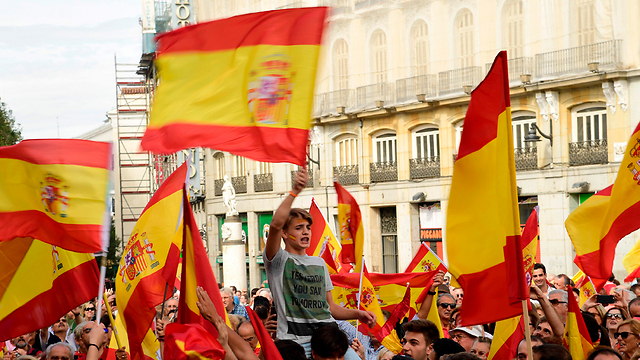After years of separation from Spain and the establishment of a new state, the citizens of the Catalonia region were forced to vote today despite the opposition. What will be the economic consequences of the disengagement? And what actually trumps the many economic arguments that both sides will lose?
"The disengagement of Catalonia from Spain will lead to very negative economic consequences for both sides," experts say. As of today, the Catalonia region is the most prosperous of the 17 provinces of Spain, accounting for about 20% of the kingdom's total economy with $ 263 billion a year and relies on tourism, exports, manufacturing and industry.
Although the Supreme Court of Spain last week passed the law passed by the Catalan parliament, which provides for a referendum on the independence of the province, the citizens of Catalonia marched on polling stations throughout Barcelona and the region on Sunday. The court gave the ruling at the request of Spain's central government in Madrid.
In Catalonia, a prosperous region with an extensive population in northeastern Spain with its own language and culture, has long aspired to independence. The attempt to promote independence has gained momentum in recent years against the background of the economic crisis in the country. Parties supporting Catalonia's secession now hold most of the seats in the General Assembly of Catalonia.

Immediate implications of separation
The consequences in the short term will be negative for both sides, according to Alain Cuenca, a professor of economics at the University of Zaragoza in Spain. "Setting a border will result in the loss of jobs, income and wealth for everyone, whether they live in Catalonia or neighboring provinces." "These losses will arise due to barriers to trade, financial problems and expenses required for the establishment of the new state," he said.
According to Business Insider reports from the beginning of the year, in the event of a disengagement, Catalonia itself will earn 16 billion euros a year as a result of the cancellation of taxes paid to Spain. This amount represents a loss of 2% of Spain's GDP.
In contrast to the expected profits, Catalonia will suffer potential damage because 35.5% of Catalonia's exports are to the Spanish market. Catalonia will also have to pay for the creation of new state buildings, such as embassies, a central bank, etc. - which will lead to a large price tag.

In early September, Spain's Finance Minister Louis de Guindus argued that if Catalonia separates from Spain and becomes an independent state, it could record a contraction of up to 30 percent of its economy and a surge in unemployment. According to the report of the Dutch bank ING, the safest projection for the new country is entering a period of uncertainty "The forecast is for a long period of uncertainty, which will be a negative factor for the private sector."
"In a recent survey, 62 percent of respondents in Catalonia said they were 'wary' about the future of the province," says Minni. "If most consumers decide to cut spending, it will hurt overall private consumption." If fears become panic, financial institutions and regulatory institutions are likely to be hurt as well. According to Minni, consumer uncertainty will lead to uncertainty around foreign investment in the region, which is a significant factor in local investment.
Spain's debt
According to data from the local central bank, in 2016, Spain's national debt stood at about 1.18 trillion dollars. At the same time, Catalonia took one of the largest debts with about 72.2 billion euros ($ 86.9 billion). Some 6 billion euros were issued as long-term bonds, and the remainder was transferred as loans from various institutions.
Many believe that the new country's national debt will be covered by Spain, but according to Cuenca, the effect of separation on debt is unpredictable. "The problem is about the transition stage, how many years of financial problems are in store for us, how many jobs, investments and commercial activity will be lost during the separation?

The success of Catalonia will depend to a great extent on whether it will take on part of Spain's national debt and whether it will be required to pay its current debt. Each of these options may lead to financial challenges and economic problems.
The European Union
"In terms of trade, if Catalonia remains part of the European Union, nothing will change," says Albert Bannell-Estenol, professor of economics at Pompeo-Fabre University. This is because Catalonia will maintain its trade partnership and will continue to use the euro. But in fact it has no automatic right to be a member of the European Union.
In order to become part of the EU, it must receive a unanimous positive response from the European Union, including Spain and its allies, which are not expected to support the process. If the entry of the new country into the EU is rejected or there are difficulties in joining it, the deadly economy will face very high costs - to date, the EU accounts for about 65.8% of Catalonia's exports
In addition, Catalonia is likely to face a trade boycott from Spain itself, which "is not clear how long or how powerful it will be," says Banal-Estenol. In addition, Catalonia will also face upheavals following the separation from the consolidated currency and an increase in customs duties on its products and services. "Most of the foreign companies are afraid of an exit from the euro bloc," says Minni.
According to data from the Dutch bank, over the past three years 70 percent of foreign investments in Catalonia come from the European Union. "In the long run, the departure of Catalonia will indirectly circumvent the consequences of the British Berkshire," he said.
In the end, the Catalan nationalists would seem willing to pay a heavy price in exchange for independence. "The economic arguments will not prevail in the debate on Catalonia's independence," Cuenca says. "It's all a question of identity."
@gazur #gazur
Downvoting a post can decrease pending rewards and make it less visible. Common reasons:
Submit
Identity crisis is viral
Downvoting a post can decrease pending rewards and make it less visible. Common reasons:
Submit